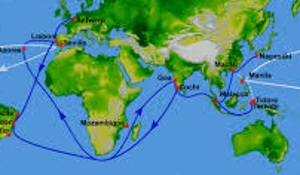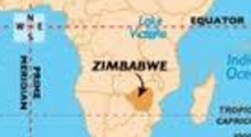
Alistair’s “Random Rambles” (2)
 By Kathy Martin…
By Kathy Martin…
The following rambles were written by Alistair for initially the “The KibKom Times” then “The KibKom Forum”
Now, perhaps a brief introduction to Africa political and social history, which may give a “back story” to past and future stories about my personal life.
Before I start I would like to say that I will likely use the terms “black” and “white” to distinguish between the natives and colonists. This is not intended to be derogatory, just classification simplicity. Members of my family, including my daughter were born in Rhodesia, so technically they are “African natives”, but they are certainly not “black”!

Before the construction of the Suez canal, the continent of Africa was a very large lump of land that used to get in the way of Europeans travelling to and from where the wealth and trading was best: India, the Far East, what was then the Dutch East Indies and of course, Australia and New Zealand.
Many ports had been established on the coastline of Africa to re-victual the sailing ships that had to go “down” and then “up” the continent. Some of the residents of these ports, as well as intrepid explorers, journeyed into the interior of sub-Saharan Africa. It was found that Africa had vast reserves of mineral wealth and, in most areas, was extremely fertile for all types of agriculture and farming. The indigenous population would be a source of cheap labour.
So, in the mid and late 19th century there was a “scramble for Africa” among many of the European powers. Even tiny Belgium (only 30.5 thousand square kilometres) colonised The Belgian Congo, now Zaire, (a massive 2.345 million square kilometres)! The native population of sub-Saharan Africa was then very primitive, being, in the majority, subsistence farmers and hunters. It was, therefore, fairly easy for the Europeans to establish colonies. An appropriate parallel would be the Roman invasion of Britain. A disciplined well armed–force could overpower an ill-equipped and comparatively primitive rabble!
The process began with the assessment of the value of all areas of each colony. Only if there was no possibility of mineral deposits or the ground was of poor agricultural worth, was it designated “tribal” land where the native (black) population were allowed to live. The fertile areas or those with mineral deposits were then grabbed by the (white) Europeans. In the white areas blacks were only allowed to live in designated areas, but only if employed by a white person or business. At face value, this seems to be very unjust but, at that time, as they remained subsistence farmers and hunters, albeit in poor quality areas, very little changed in the lifestyle of the natives. Indeed, those in paid employment on the white-run farms and mines enjoyed a great improvement.

The trouble was, (and here I can only speak with confidence about Rhodesia), white children were educated at schools and even university. The only education available to black children was the very basic “3 R’s” at church-run mission schools. Unfortunately these were few and far between and so very few children (future adults) benefitted. The white government justified this as taxes were only paid by the whites. This was true; no black was ever in a position where he earned enough to pay tax.
Good heavens no, if that happened he might be in a position where he could give a white person orders! This would mean that many moustachioed colonial colonel Blimps would suffer apoplexies over their whiskey and sodas and, well, the end of civilisation as they knew it!
Should a Rhodesian call for an electrician, a white “boss” would appear accompanied by one or two black “boys”, who would do the actual work while the boss drank tea. The “boys” were often older than the “boss”! In all occupations the whites supervised and earned a lot of money, while the blacks did the work and earned a pittance!
As I said a couple of paragraphs earlier, at the start of colonisation, many blacks did benefit from paid (however poorly) employment. But a hundred years or so later, the aspirations, abilities and ambitions of the primitive blacks has improved, indeed they were no longer so primitive!
However, the opinion of the white rulers had not changed, and was determined to maintain the status quo. If you think that this was a purely “African” situation, remember the “stick in the mud” attitude of male parliamentarians that gave rise to the suffragette movement in Britain during the early part of the 20th century!

On the subject of pay differences based on race, here is one example of how the pen is mightier than the sword! My first job on leaving school was to join the police. The Rhodesian police had European constables and African constables. The rank of sergeant had the identical racial split. The “Europeans” were on a much higher pay scale than those of the “Africans”.
Representations were made to the police Pay Commission. I think that it surprised everybody that the Pay Commission agreed that the discrepancy would be rectified by (say) the 1st April! As it was obvious that the “Europeans” would not accept a pay cut, the “Africans” became very excited. Sure enough, the directive came out:
Paragraph (1) “With effect from 1st April all constables and sergeants will be on the same respective pay scales, irrespective of race”
But then…………
Paragraph (2) “With effect from 1st April all European constables will hold the rank of patrol officer; all European sergeants will hold the rank of section officer”
As they say in France “plus ça change, plus c’est la même chose”! (The more it changes, the more it stays the same).
The police had a strict policy that all commissioned officers (inspectors and above) had to rise through the ranks.
After Rhodesia declared unilateral independence (UDI) the British parliament sent out a number of “fact-finding” teams in an attempt to resolve the situation. When they asked why there were no black commissioned officers in the police they had to be satisfied with the reply “no suitable candidates”. They were invited to inspect the laid down written procedures.
True enough, there was no mention of race, colour or creed in the requirements to apply for the inspectorate promotion course at Morris Depot, one of the two police training depots. What they did not notice was that, due to evening or night classes and exercises, the promotion candidates were required to “live in” at Morris depot during the two week course. Morris depot was designated a “white” only residential area. The adjacent depot (Tomlinson) was the designated “black” residential area! So, irrespective of ability, no black policeman could ever progress to a commissioned rank!
If as much effort and ingenuity had gone into “good” works, rather than such sly cunning, there would be no world poverty!
Both Kibris / Cyprus and Rhodesia, where I grew up, experienced trade and political embargoes, but there were (many economic) differences.
Immediately after the Rhodesian government declared unilateral independence (UDI) Britain championed sanctions and embargoes on Rhodesia. This was despite the declaration being in full accordance with the law of the land in Rhodesia. Admittedly, the law favoured the 750,000 whites over the 7,500,000 blacks (both figures approximate), but nonetheless it was the law, and Britain and the rest of the world, bowing to pressure from black Africa, applied sanctions for political expedience. I remember the words of “Rule Britannia” being parodied as “Britannia waives the rules!
 Rhodesia was a largely self-sufficient country, rich in various resources (especially gold!) and was recognised by both South Africa and Portugal, who continued to trade freely with Rhodesia. Portugal traded through the Portuguese colony of Mozambique that formed Rhodesia’s eastern border. Most other European countries (1965 was long before the EU!) continued to trade with Rhodesia, albeit by devious means. As such the only real effect of the trade embargo was a slight increase in prices and the disappearance of “British” brand names, HP sauce, Marmite etc.
Rhodesia was a largely self-sufficient country, rich in various resources (especially gold!) and was recognised by both South Africa and Portugal, who continued to trade freely with Rhodesia. Portugal traded through the Portuguese colony of Mozambique that formed Rhodesia’s eastern border. Most other European countries (1965 was long before the EU!) continued to trade with Rhodesia, albeit by devious means. As such the only real effect of the trade embargo was a slight increase in prices and the disappearance of “British” brand names, HP sauce, Marmite etc.
The signs at BP (British Petroleum) petrol stations were replaced by Total (French) or Shell (Dutch). Fuel rationing was introduced, but as there was no real shortage at first, payment of an extra 5 cents a litre would allow the tank to be filled! So the only people who were affected by the embargo were the British exporters and, unfortunately, the poor blacks who were already on the breadline. I am sure that no British politician ever tried to explain to an increasingly poverty‑stricken black that his situation was caused by something that was in his best interests!
Such was the strength of the economy under white minority rule that majority rule did not begin until 1979; 14 years after the economic embargoes began. In fact the main reason for the change was not economic, but the ever-increasing number of whites leaving the country due to the war. This caused a vacuum of middle and senior management in companies and businesses that the uneducated and inexperienced blacks (through no fault of their own) were unable to fill.













